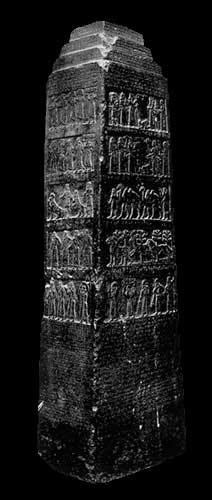2 Kings 10 Background Information with Maps and Images (Picture Study Bible - 2 Kings) Free Bible Online
2 Kings 10
Select a Chapter
-
2 Kings 1 |
2 Kings 2 |
2 Kings 3 |
2 Kings 4 |
2 Kings 5 |
2 Kings 6 |
2 Kings 7 |
2 Kings 8 |
2 Kings 9 |
2 Kings 10 |
2 Kings 11 |
2 Kings 12 |
2 Kings 13 |
2 Kings 14 |
2 Kings 15 |
2 Kings 16 |
2 Kings 17 |
2 Kings 18 |
2 Kings 19 |
2 Kings 20 |
2 Kings 21 |
2 Kings 22 |
2 Kings 23 |
2 Kings 24 |
2 Kings 25 |
Select a Book of the Bible
-
Genesis |
Exodus |
Leviticus |
Numbers |
Deuteronomy |
Joshua |
Judges |
Ruth |
1 Samuel |
2 Samuel |
1 Kings |
2 Kings |
1 Chronicles |
2 Chronicles |
Ezra |
Nehemiah |
Esther |
Job |
Psalms |
Proverbs |
Ecclesiastes |
Song of Solomon |
Isaiah |
Jeremiah |
Lamentations |
Ezekiel |
Daniel |
Hosea |
Joel |
Amos |
Obadiah |
Jonah |
Micah |
Nahum |
Habakkuk |
Zephaniah |
Haggai |
Zechariah |
Malachi |
Matthew |
Mark |
Luke |
John |
Acts |
Romans |
1 Corinthians |
2 Corinthians |
Galatians |
Ephesians |
Philippians |
Colossians |
1 Thessalonians |
2 Thessalonians |
1 Timothy |
2 Timothy |
Titus |
Philemon |
Hebrews |
James |
1 Peter |
2 Peter |
1 John |
2 John |
3 John |
Jude |
Revelation |
Brief Summary: We have in this chapter, I. A further account of Jehu's execution of his commission. He cut off, I. All Ahab's sons (v. 1-10). All Ahab's kindred (v. 11-14, v. 17). Ahab's idolatry: his zeal against this he took Jonadab to be witness to (v. 15, v. 16), summoned all the worshippers of Baal to attend (v. 18-23) and slew them all (v. 24, v. 25), and then abolished that idolatry (v. 26-28). II. A short account of the administration of his government. 1. The old idolatry of Israel, the worship of the calves, was retained (v. 29-31). This brought God's judgments upon them by Hazael, with which his reign concludes (v. 32-36).
Outline
Ahab's sons and Ahaziah's brethren put to death. (1-14)
Jehu destroys the worshippers of Baal. (15-28)
Jehu follows Jeroboam's sins. (29-36)
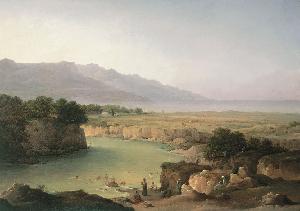
Painting of the Jordan by Chernetsov
The Black Obelisk
The Black Obelisk of Shalmaneser III. Discovered at Calah now in the British Museum. The Obelisk stands nearly 7 feet tall and is about 2 feet thick. On each of the 4 sides there are 5 panels with carvings of various kings bringing tribute to king Shalmaneser III. The second panel from the top of the obelisk reveals king Jehu of Israel bowing at the feet of Shalmaneser of Assyria. This is the same Jehu who is mentioned in Scripture, and this carved relief is the only image in all history of one of the Hebrew kings. On the panel Shalmaneser is offering a libation to his god. The cuneiform text around the panel reads:
"The tribute of Jehu, son of Omri: I received from him silver, gold, a golden bowl, a golden vase with pointed bottom, golden tumblers, golden buckets, tin, a staff for a king [and] spears."
2 Kings 10:31 "But Jehu took no heed to walk in the law of
the LORD God of Israel with all his heart; for he did not depart
from the sins of Jeroboam, who had made Israel sin."
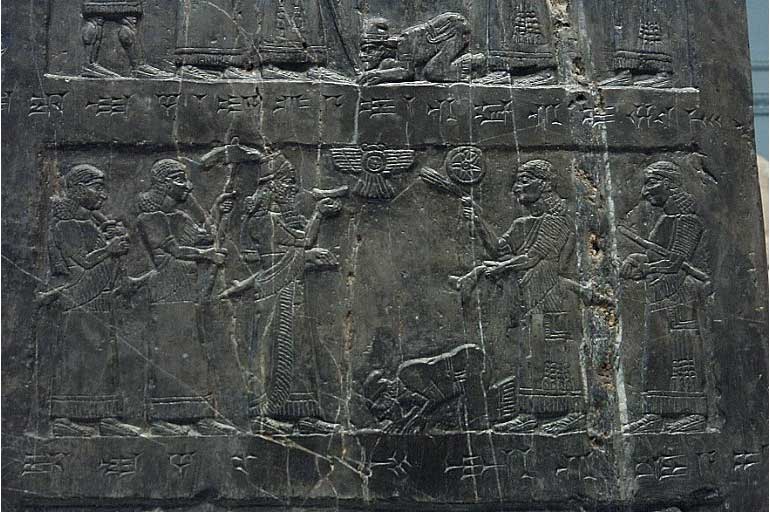
The Jehu Panel on the Black Obelisk
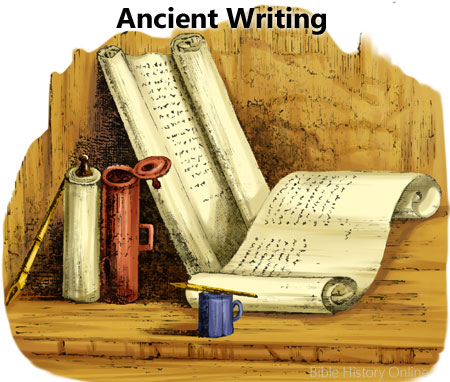
Painted sketch of ancient writing instruments
Important Topics for Bible Study
Quick Reference Map
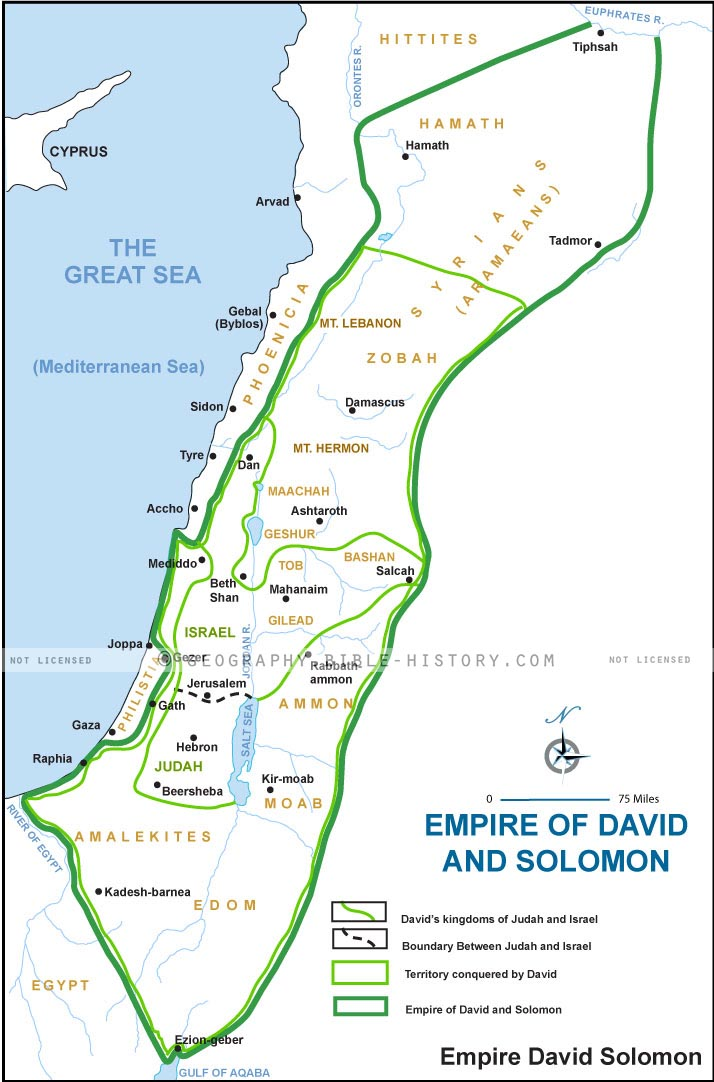
Map of the Kingdoms of David and
Solomon
(Click to Enlarge)
Ancient Customs
Ancient People
Geography
the wilderness
the mount of God
Quick Reference Maps
Israel and Judah - The kingdoms of Israel and Judah during the period of the kings can be seen on this map. After Solomon had died there was a civil war and 10 tribes took to the north and were called the northern kingdom of Israel, and every king was evil and forsook the LORD. The remaining 2 tribes stayed in the south and were called the southern kingdom of Judah, several of those kings trusted in the LORD.
Mesha's Kingdom - The Bible reveals that Mesha, the king of Moab rebelled against Jehoram the king of Israel (2 Kings 3:4-5). Jehoram requested the help of Judah and Jehoshaphat allied with him, he sought Elisha the prophet and victory was predicted, only because of the faith of Jehoshaphat. Mesha sought the god Chemosh and sacrificed his own son (2 Kings 3:27).
Israel and Syria Naaman the leper, captain of the Syrian army was healed by a miracle at the command of Elisha the prophet (2 Kings 5). At that time Aram (Syria) was a dominant fighting machine in the north under the leadership of Ben-Hadad, who was later murdered by Hazael (2 Kings 8:15).
Syria at Its Height - 2 Kings 10 reveals that Hazael of Syria smote all the coasts of Israel and the east Jordan territory expanding the kingdom of Damascus. Jehu knew that he would need to rely on a foreign power for help and he turned to Shalmanessar IV, King of Assyria.
The Kingdom of Jeroboam II - 2 Kings 14:25 indicates that Jeroboam II, fourth king from the line of Jehu, brought the northern kingdom of Israel to its greatest extent in the north. This was just after Syria was severely crushed by the Assyrians who had recently returned home to regroup.
Habor, the River of Gozan - In 2 Kings 17:6 the Bible says that the King of Assyria (Sargon II) conquered Samaria and took away the remaining inhabitants of Israel as prisoners to Assyria, and placed them in Halah and in Habor by the river of Gorzan, and in the cities of the Medes. The river of Gorzan is identified as the river Khabur, a tributary of the Euphrates river which flows into it from the north from southern Turkey.
The Cities of Samaria and the Surrounding Lands - The Bible records in second Kings 17:24 that the King of Assyria (Sargon II) brought colonists from many of the cities within the Assyrian Empire: Babylon, Cuthah, Ava, Hamath, and from Sepharvaim, and placed the inhabitants within the cities of Samaria to replace the children of Israel who would been taken into captivity.
The Assyrian Empire When Sennacherib Came to Power - Israel was destroyed, Judah was left and Hezekiah a man who sought the LORD had come to power in 720 BC. He offered tribute to Sennacherib but Jerusalem was was still a target for the Assyrian ruler.
The Assyrian Empire During the Reign of Esarhaddon - Esarhaddon marches into Egypt and extends the Assyrian Empire. 2 Kings 19
Necho Battles Josiah - Pharaoh Necho on his way to the Euphrates slays King Josiah at Megiddo. 2 Kings 23
The Babylonian, Mede and Persian Empires - Pharaoh Necho is defeated by Nebuchadnezzar II of Babylon who also destroyed Jerusalem in 586 BC. Later the Mede and Persian Empires defeated Babylon and governed the world in the sixth century BC until Alexander the Great.
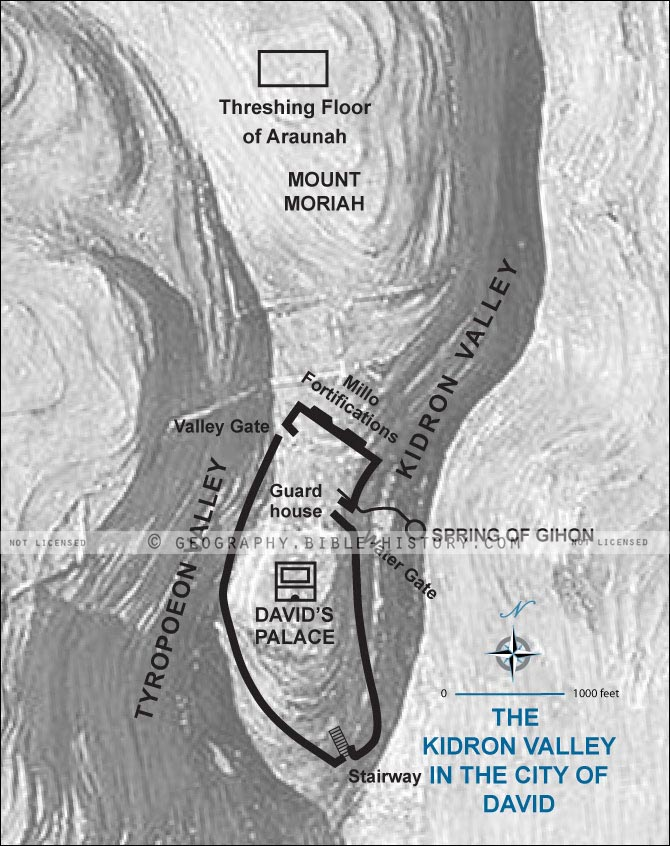
Map of the Kidron Valley in the
City of David
(Click to Enlarge)
The Old Testament
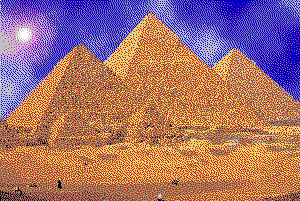
2 Kings Resources
Saul,
Israel's First King
King
David
King
Solomon
The Divided Kingdom
The
Northern Kingdom of Israel
The
Southern Kingdom of Judah
The Assyrian Captivity
The Babylonian Captivity
Bibliography Information
Free Bible Online - Picture Study Bible, King James Version. New York: American Bible Society: www.free-bible.com, 1995-2013. Bible History Picture Study Bible. Jan 13, 2026.
- King James Bible Home
- Free Bible Home Page
- Bible Encyclopedia (ISBE)
- Online Bible (KJV)
- Naves Topical Bible
- Smith's Bible Dictionary
- Easton's Bible Dictionary
- Fausset's Bible Dictionary
- Matthew Henry Bible Commentary
- Hitchcock's Bible Dictionary
Read The Bible
- 1599 Geneva Bible (GNV)
- 21st Century King James Version (KJ21)
- American Standard Version (ASV)
- Amplified Bible (AMP)
- Amplified Bible, Classic Edition (AMPC)
- Authorized (King James) Version (AKJV)
- BRG Bible (BRG)
- Christian Standard Bible (CSB)
- Common English Bible (CEB)
- Complete Jewish Bible (CJB)
- Contemporary English Version (CEV)
- Darby Translation (DARBY)
- Disciples’ Literal New Testament (DLNT)
- Douay-Rheims 1899 American Edition (DRA)
- Easy-to-Read Version (ERV)
- English Standard Version (ESV)
- English Standard Version Anglicised (ESVUK)
- Evangelical Heritage Version (EHV)
- Expanded Bible (EXB)
- GOD’S WORD Translation (GW)
- Good News Translation (GNT)
- Holman Christian Standard Bible (HCSB)
- International Children’s Bible (ICB)
- International Standard Version (ISV)
- J.B. Phillips New Testament (PHILLIPS)
- Jubilee Bible 2000 (JUB)
- King James Version (KJV)
- Lexham English Bible (LEB)
- Living Bible (TLB)
- Modern English Version (MEV)
- Mounce Reverse Interlinear New Testament (MOUNCE)
- Names of God Bible (NOG)
- New American Bible (Revised Edition) (NABRE)
- New American Standard Bible (NASB)
- New American Standard Bible 1995 (NASB1995)
- New Catholic Bible (NCB)
- New Century Version (NCV)
- New English Translation (NET)
- New International Reader's Version (NIRV)
- New International Version - UK (NIVUK)
- New International Version (NIV)
- New King James Version (NKJV)
- New Life Version (NLV)
- New Living Translation (NLT)
- New Matthew Bible (NMB)
- New Revised Standard Version (NRSV)
- New Revised Standard Version Catholic Edition (NRSVCE)
- New Revised Standard Version, Anglicised (NRSVA)
- New Revised Standard Version, Anglicised Catholic Edition (NRSVACE)
- New Testament for Everyone (NTE)
- Orthodox Jewish Bible (OJB)
- Revised Geneva Translation (RGT)
- Revised Standard Version (RSV)
- Revised Standard Version Catholic Edition (RSVCE)
- The Message (MSG)
- The Voice (VOICE)
- Tree of Life Version (TLV)
- World English Bible (WEB)
- Worldwide English (New Testament) (WE)
- Wycliffe Bible (WYC)
- Young's Literal Translation (YLT)
Table of Contents
Main Menu
- Ancient Assyrian Social Structure
- Ancient Babylonia
- Ancient Canaan During the Time of Joshua
- Ancient History Timeline
- Ancient Oil Lamps
- Antonia Fortress
- Archaeology of Ancient Assyria
- Assyria and Bible Prophecy
- Augustus Caesar
- Background Bible Study
- Bible
- Biblical Geography
- Fallen Empires - Archaeological Discoveries and the Bible
- First Century Jerusalem
- Glossary of Latin Words
- Herod Agrippa I
- Herod Antipas
- Herod the Great
- Herod's Temple
- High Priest's in New Testament Times
- Jewish Literature in New Testament Times
- Library collection
- Map of David's Kingdom
- Map of the Divided Kingdom - Israel and Judah
- Map of the Ministry of Jesus
- Matthew Henry Bible Commentary
- Messianic Prophecy
- Nero Caesar Emperor
- Online Bible Maps
- Paul's First Missionary Journey
- Paul's Second Missionary Journey
- Paul's Third Missionary Journey
- Pontius Pilate
- Questions About the Ancient World
- Tabernacle of Ancient Israel
- Tax Collectors in New Testament Times
- The Babylonian Captivity
- The Black Obelisk of Shalmaneser
- The Books of the New Testament
- The Court of the Gentiles
- The Court of the Women in the Temple
- The Destruction of Israel
- The Fall of Judah with Map
- The History Of Rome
- The Incredible Bible
- The Jewish Calendar in Ancient Hebrew History
- The Life of Jesus in Chronological Order
- The Life of Jesus in Harmony
- The Names of God
- The New Testament
- The Old Testament
- The Passion of the Christ
- The Pharisees
- The Sacred Year of Israel in New Testament Times
- The Samaritans
- The Scribes
Ancient Questions
- Why Do the Huldah Gates Appear Different in Ancient Replicas and Modern Photos?
- What Is the Origin of the Japanese and Chinese Peoples? A Biblical Perspective
- How did the ancient Greeks and Romans practice medicine and treat illnesses?
- What were the major contributions of ancient Babylon to mathematics and astronomy?
- How did the ancient Persians create and administer their vast empire?
- What were the cultural and artistic achievements of ancient India, particularly during the Gupta Empire?
- How did ancient civilizations like the Incas and Aztecs build their remarkable cities and structures?
- What were the major trade routes and trading practices of the ancient world?
- What was the role of slavery in ancient societies like Rome and Greece?
- How did the ancient Mayans develop their sophisticated calendar system?
Bible Study Questions
- Why Do Christians Celebrate Christmas?
- How Many Chapters Are There in the Bible?
- The Five Key Visions in the New Testament
- The 400-Year Prophecy: Unpacking Genesis 15 and the Journey of a People
- The Authorized (King James) Version (AKJV): Historical Significance, Translation Methodology, and Lasting Impact
- Exploring the English Standard Version (ESV): Its Aspects, Comparisons, Impact on Biblical Studies, and Church Use
- A Detailed Historical Analysis of Language Updates in the KJ21: Comparison with Other Versions
- A Detailed Historical Analysis of the American Standard Version (ASV): Comparison to the King James Version, Influence on Later Translations, and Evaluation of Strengths and Weaknesses
- A Detailed Historical Analysis of Amplifications in the Amplified Bible (AMP) and Its Comparison to Other Bible Translations
- Detailed Historical Analysis of the Amplified Bible Classic Edition (AMPC): Examples of Amplifications and Comparative Analysis with Other Bible Translations
About
Welcome to Free Bible: Unearthing the Past, Illuminating the Present! Step into a world where ancient history and biblical narratives intertwine, inviting you to explore the rich tapestry of human civilization.
Discover the captivating stories of forgotten empires, delve into the customs and cultures of our ancestors, and witness the remarkable findings unearthed by dedicated archaeologists.
Immerse yourself in a treasure trove of knowledge, where the past comes alive and illuminates our understanding of the present.
Join us on this extraordinary journey through time, where curiosity is rewarded and ancient mysteries await your exploration.
Recent posts
-

Modern Christian Abstract Art Canvas Prints | Artesty
Modern Christian Abstract Art: Contemporary Spiritual Wall Art for a Modern Home Modern Christian art makes it easier to bring faith into everyday spa... -

Best Paphos property developers (and how to choose the right one)
Buying property in Paphos is one of the most popular real-estate decisions in Cyprus, whether the goal is relocation, lifestyle living, or long-term i... -

CQR Pants vs 5.11 Tactical: My Honest Review After Hiking the Jesus Trail and Via Dolorosa
After walking 65 kilometers through the Galilee hills and navigating Jerusalem's ancient stone streets, I can tell you exactly which tactical pants su... -

Finding the right services for immigrants in the United States
As we understand, life for immigrants in the United States can be challenging, especially in the early stages. Once you have solved the most important... -

Onigiri packaging for retailers and cafés
Onigiri packaging for retailers and cafés plays a crucial role in preserving freshness, ensuring food safety, and enhancing product presentation. As ...
